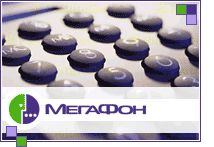The Swiss Court of Arbitration takes Megafon away from Alfa
The Russian communication market may experience serious problems

The Court of Arbitration of the International Chamber of Commerce made an important decision on August 25 in Geneva, which may lead to serious consequences on the Russian telecommunication market. The international justice ruled after several thoughtful months that the financial and industrial organization Alfa-Group is not the conscientious holder of 25.1 percent of shares of one of Russia's leading cellular operators, the company Megafon. 
The company Alfa-Eco, a part of Alfa-Group, announced the purchase on August 5th, 2003. It acquired the company LV Finance, which owned Megafon's stocks through its companies Transcontinental Mobile Investment Ltd and CT-Mobile. Megafon's minority shareholder, IPOC International Growth Fund Ltd., expressed its indignation in connection with Alfa's announcement. It is an investment fund for high-tech, telecommunication, media and biotechnologies, which already owns 6.5 percent of Megafon's shares. Forecasting a fast development of the communication industry in Russia, IPOC concluded two option agreements in April and December of 2001 with LV Finance's head, Leonid Rozhetskin. The agreements stipulated the sale of Megafon's shareholding, Prime-Tass reports.
According to the terms of agreements, LV Finance did not have a right to sell Megafon's shares to its competitors or any affiliated organizations. It is noteworthy that Alfa holds the blocking shares of Vympelkom – Megafon's direct competitor. Communication market analysts believe that if a company, which already holds a cellular operator, intends to acquire the stocks of another cellular company, it means that the companies either plan a merger, or take preventive measures against an actively developing competitor. In addition, IPOC has paid over $50 million to LV Finance within two years, according to option terms.
It goes without saying it was decided to take the matter to court - there was nothing left to do in this situation. Lawsuits were sent to the Geneva-based Court of Arbitration of the International Chamber of Commerce and to the arbitration court in Zurich, as option agreements stipulate.
The Geneva Court of Arbitration, at which the hearings ended in May of the current year, unraveled numerous cunning tricks. As a result, Alfa-Eco obtained the right for 25.1 percent of Megafon's shares. To make the transaction legally pure, Leonid Rozhetskin and Alfa-Group carried out the sale, mediated by several offshore companies, which had been set up especially for this purpose. The Geneva-based court was not confused about it at all, the Vedomosti wrote.
The award of the Court of Arbitration of the International Chamber of Commerce runs "Having considered all the arguments and evidence in this case, the Arbitral Tribunal concludes that Mr. Rozhetskin and Respondent [LV Finance] did negotiate and agree directly with the Alfa group the latter's purchase of Respondent and the way in which the purchase was structured; the Alfa group conducted due diligence and purchased Respondent with knowledge of Claimant's rights under the option agreements; the present holders of the relevant shares [three Alfa Group companies based in the British Virgin Islands] are not bona fide purchasers for value without notice; and the Arbitral Tribunal rejects the contrary evidence of Mr. Maevsky and Mr. Moskalev [on behalf of LV Finance]."
It is up to the Zurich-based court to make its decision now. The second litigation will start there in September. Alfa-Group pretends that it has nothing to do with it, because neither the group itself, nor its structures participated in the process. Yet, it is obvious that Alfa-Group's head, Mikhail Fridman does not feel happier because of it. The group's improper actions with Megafon's shares may lead to serious consequences of the industrial and financial organization. Fridman became an oligarch owing to the active and aggressive business politics and his ability to takeover profitable enterprises in a cold-blooded way: for example the Achinsk-based Alumina Factory, the Korshunovsky ore mining and processing enterprise, the West-Siberian metallurgical factory and a lot of other companies, to which Megafon was supposed to join, the Kommersant wrote.
Such politics is not welcomed in Russia nowadays. It is not ruled out that Fridman, as several other Russian oligarchs, will start looking for his place under somebody else's sun in the near future. In this case his name will be in frequent presence in tabloids' stories describing the lives of former Russian citizens abroad; it will most likely vanish from economic articles of respectable newspapers and magazines. Unfortunately, Russian financial magnates have not realized it yet that the Western civilized capital is very scrupulous when it comes to choosing business partners.
Subscribe to Pravda.Ru Telegram channel, Facebook, RSS!


